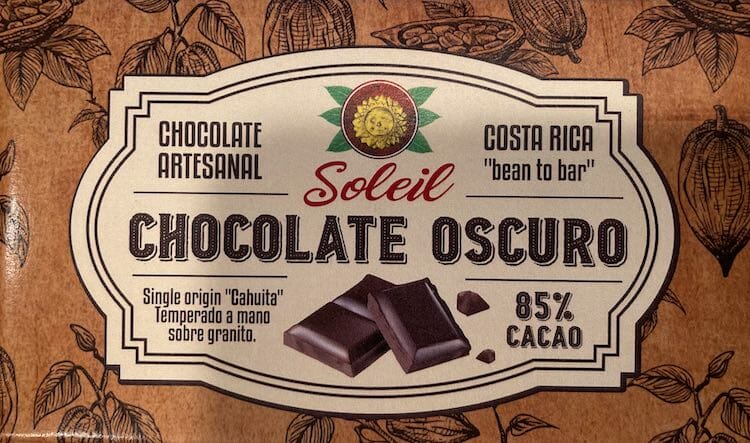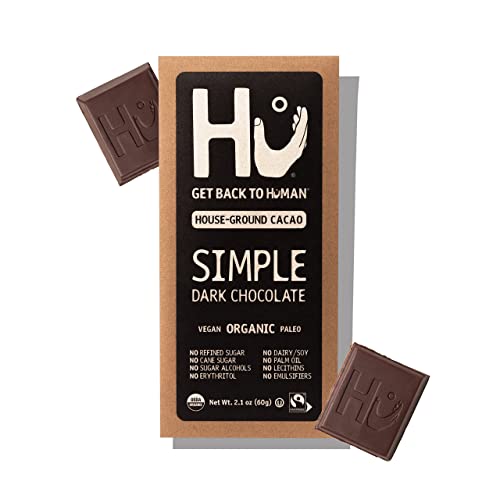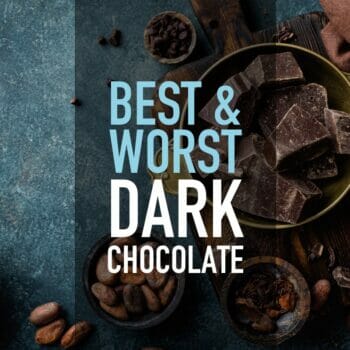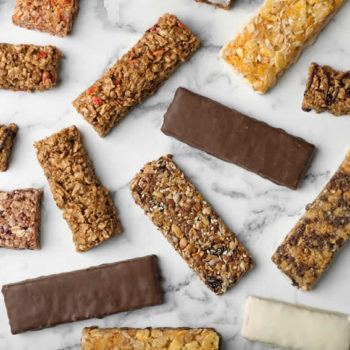Dark Chocolate: The Best and Worst Brands

Dark chocolate is arguably one of the best feel-good snacks for healthy eaters.
Research points to an increased exercise capacity and improved cardiovascular system..
This is due to the flavanol content – a type of polyphenol in cocoa that helps lower blood pressure and improve vascular function and even provides UV protection for our skin.
What is a high quality dark chocolate?
When choosing a quality healthy dark chocolate, here are the qualities to look for in a bar.
- High cacao content (> 70%).
- Low sugar content.
- Few additives and overall ingredients.
- No added flavor.
- No preservatives.
- Not “dutched” or processed with alkali.
If your chocolate says “processed with alkali” on the nutrition label, then it’s going to have fewer flavanols.
Processing with alkali is called Dutching, and it’s done to reduce acidity, making the chocolate a darker color (and arguably improving the flavor).
There is nothing unsafe about dutching – it may make the flavor more appealing to some, but lead to less health benefits.
Beware of marketing labels
Many chocolates are labeled with all kinds of marketing words like artisan, hand-crafted, fine chocolate.
These are opinions and cannot be tested. Some chocolates are labeled gluten-free – which is odd as chocolate never contained gluten.
The best dark chocolate brands
My top 5 at a glance:
- Pascha is the best all round.
- Hu is a great choice if you can’t handle more than 70% 😉.
- The Taza 85% Mexicana Chocolate disk is special: Just cacao beans & sugar 😋
- Alter Eco 85% Raspberry Blackout – Dark with a tang of flavor.
- Lindt 85% is the best combo of value-for-money and healthy benefits.
Here’s the whole list, sort-of in order from best:
Pascha
Range of 55% – 100% cacao.
- Organic, fair trade, non-GMO
- No soy lecithin
- Is not dutch processed
Hu Dark Chocolate
A range of 70% cacao products including bars, chocolate-covered nuts, and chocolate-covered berries.
- Organic, vegan, paleo, non-GMO.
- No dairy, soy lecithin, gluten, cane sugar, sugar alcohols, or emulsifiers.
- Is not dutch processed.
Taza
70%, 80%, 87%, and 95% cacao bars.
Taza is among the least-processed chocolate you can find.
- USDA organic
- Is not dutch processed.
Alter Eco
USDA Organic and Fair Trade. No soy lecithin. Is not dutch processed.
The darks range from 70%, 85%, 90%, and the 100% total blackout.
- USDA Organic and Fair Trade.
- No soy lecithin.
- Is not dutch processed.
Lindt
The Lindt Excellence range includes 70%, 78%, 85%, 90%, 95%, 99%, and 100% Cacao bars.
Ingredients: Check your label as these change:
- 70% – Chocolate, sugar, cocoa butter, soya lecithin (emulsifier), bourbon vanilla beans.
- 78% – Chocolate, cocoa butter, sugar, cocoa powder processed with alkali, milkfat.
- 85% – Chocolate, cocoa powder, cocoa butter, demerara sugar, bourbon vanilla beans.
- 90% – Chocolate, cocoa butter, cocoa powder processed with alkali, sugar, bourbon vanilla beans.
- 95% – Chocolate, cocoa butter, cocoa powder processed with alkali, sugar
- 100% – Chocolate, cocoa powder processed with alkali, cocoa butter.
Beyond Good
70%, 73%, 80%, and 92% bars made at source in Madagascar.
- Completely organic
- Direct trade
- Is not dutch processed
Pacari
70%, 85%, 100%, 100% + nibs.
- USDA organic, direct trade, raw bars.
- Is not dutch processed.
Endangered Species
72%, 75%, and 88% bars.
- Fair trade.
- Donates 10% of profits to conservation efforts.
Theo
85% and many different flavored 70% bars.
- Fair trade and organic.
- No emulsifier

Righteously Raw
80%, 83%, and 90%.
- Organic, fair trade, raw.
As far as we’re aware only chocolate is processed on their machinery, so is allergen-free.

Giddy Yoyo
Huge range: 70% up to 100% (and almost everything in between). Based in Canada with simple ingredients (cacao paste + sugar + cacao butter).
- Certified organic
- Is not dutch processed

Bixby & Co.
70% and 100% single origin darks. Ingredients just cocoa beans and cane sugar.
- Certified organic
Valrhona
70%, 75%, 85%, and 100% cacao bars. French chocolatier with a large range of ‘taster’ bars.
Ingredients: Cocoa Beans, Sugar, Cocoa Butter, sunflower lecithin, Natural Vanilla Extract
Some product at Amazon.

Amano
70% bars, single origin.
Sweetened with sugar and vanilla beans (no soy lecithin).
Moser Roth
70% and 85% bars. A German-made chocolate supplying Aldi stores.
Uses Soy Lecithin emulsifier.
85% is dutch processed.
Note that ingredients differ between countries.
Scharffen Berger
70% and 82% bars. (Scharffen is owned by a subsidiary of Hershey).
Ingredients: Chocolate, Sugar, Whole Vanilla Beans.
Lily’s
70%, 85%, and 92% – sweetened with Stevia (and Erythritol).
- Fair trade
- Is not dutch processed
Chocolove
Small producer with 70% and 88% bars. Does contain soy lecithin.
Ghirardelli
70%, 72%, 86%, 92% and a 100% “baking” bar.
Uses soy lecithin as an emulsifier, and also has milk fat and “natural flavor” in their dark bars.

ChocZero
Chocolate squares for keto diet market. Monk Fruit extract is used as a sweetener, and fiber has been added (soluble corn fiber).
The 85% or 92% are best.
Notable Mentions
There are many chocolate brands with a local market, some of whom offer exceptionally good chocolates.
Here is a curated collection of some that we’ve come across.
- Solomon’s Gold (New Zealand) – 70% bars and a 75% with cacao nibs. The nibs give it a unique texture and mouthfeel.
- Whittaker’s (New Zealand) – A huge variety of flavors – 72% Dark Ghana being a popular choice. The specialty blocks range from 70% to 92%.
- Loving Earth (Australia) – A great 72% and 85% bar – organic, and with some nice flavors.
- Camino (Canada) – The ‘Intensely Dark’ 88% is the best choice.
- Valore (Spain) – Have a 70% bar with very high almond content (25%).
- Ombar (UK) – Raw chocolatiers with 72%-100% dark.
- Guittard (CA) – 80%-91% dark chocolate.
- Antidote (USA) – Does 100% raw chocolate bars.
- Eden Confections (US Northeast) – 70% – no sugar (sweetened with Monk fruit and erythritol.
- Eating Evolved (NY) – Organic right up to 100%.
- Zotter Chocolates (Austria) – they offer a mouthwatering array of flavors, and also, 80%-96% dark chocolate bars (the Labooko range) – also certified Fair Trade.
- Heidi (Romania) – Do a 70%, 75% and 85% bar. Similar formulation to Lindt.
- Montezuma Chocolates (UK) – The biggest range of 100% bars you’ll find.
- Vannucci Chocolate (Italy) – 73% and 100% bar.
- Moonstruck Chocolate (USA) – Specialty chocolates – 68% and 73% dark.
- Askinosie (USA) – Single origin – try the super dark 88%.
- Zazubean (Canada) – Fair trade and organic. Includes an 85% bar – for the keto market.
- Frey (Switzerland) – Look for the 85% bar.
- Claudio Corallo – Artisan chocolate made from the most simple ingredients.
- Vosges (USA) – Lots of interesting flavors including the 85% cacao fruit bar.
- HNINA (USA) – raw organic dark chocolate – 85%. No sugar, soy, or dairy.
- Cocoa Parlor (USA) – USDA organic and fair-trade, 70% up to 100%. The subtitle is “organic plant-based chocolates”. Well, I guess cacao does come from a tree !?
- Vanini (Italy) – Range from 70%-100% single origin.
- Pana Organic (UK) – Selection of raw organic bars, including ‘Eighty’ – sweetened with dark agave nectar.
- Sam’s Choice (Walmart) – Choose the 90% dark. Ingredients: Chocolate liquor, cocoa butter, sugar, cocoa powder, vanilla beans.
- Ritter Sport (Germany) – Mostly milk chocolates, but they do have a 74% and 81% dark bar.
- The Good Chocolate – A selection of chocolates for Keto dieters (sweetened with Stevia and erythritol).
Bean to Bar: Soleil Chocolate

Posing with the bars we made
I recently traveled to Costa Rica and participated in a chocolate tour at Soleil.
The tour involved a learning about cacao, trying whole raw cacao beans. We learned how to make bean to bar chocolate by removing the outer shell, and then grinding the cacao nibs to release the oils.
We then tempered the processed cacao and sugar and put the chocolate into molds.
The taste was amazing and some of the best dark chocolate I’ve ever had.
If you ever go to Costa Rica I recommend paying them a visit at their facility just outside San Jose in Atenas, Costa Rica.

Strongest dark chocolate bars
The more cacao the bar has, the stronger the bar is.
10 years ago it was hard to find many bars above 70%, but now there is great choice. If you have a sweet tooth, it will take some practice to go beyond 70%.
Is there such thing as 100% dark chocolate?
Yes. It means there is no form of sweetener at all, giving the chocolate a bitter savory flavor.
Generally dark chocolates above 90% have very little sweetness, and are an acquired taste.
The following brands make very dark chocolates (including 100%).
- Pascha 100%
- Alter Eco 90% and 100%
- Taza 95% Wicked Dark
- Lindt 95%, 99%, and 100%
- Pacari 100% and 100% + nibs
- Vivani 92% and 100%
- Giddy Yoyo Raw 100% Cacao
Dark chocolates that aren’t very healthy 👎

A popular bar, but Dove dark chocolates don’t make the grade.
There is no legal definition of dark chocolate. Most people consider anything above 55% cacao content to be dark.
That doesn’t stop candy manufacturers calling their product dark, when the cacao content is very low.
- Dove Dark Chocolate
Low cacao content. All processed with alkali. - Godiva 72% dark mini bars
Lots of packaging, uses Soy lecithin, and butter oil. - CocoaVia Supplement Packs
These are similar to Crystal Light, except they have flavanols added in. You will get some health benefits from this, but it is more important to eat the whole food that contains the fiber. - Hershey’s Special Dark
Processed with alkali. High in sugar. - Hershey’s Dark Chocolate Kisses
Despite claims on the package about flavanols, this is a milk chocolate. - Dark Chocolate M&M’s
The ingredients list is ambiguous (they list “chocolate” as an ingredient). However, these are high in sugar (more like candy than dark chocolate).
- Milky Way Midnight
Like all the candy brands, this is not really a dark chocolate. It has more sugar than cacao and is processed with alkali.
- Kit Kat Dark
Not sure how they can call this dark. Lots of sugar and palm kernel oil. - Nestle Dark Hot Chocolate
Ouch! This beverage mix is the worst of the lot. Sugar, trans-fat, and processed with alkali. - Cadbury Bournville
60g of sugar per small bar. - Cadbury Old Gold
It says dark chocolate on the label, but it is a dairy milk – with a high sugar content. - Cadbury Royal Dark
Ingredients: Semi-Sweet Chocolate (Sugar; Cocoa Butter; Chocolate; Milk Fat; Natural and Artificial Flavor, Soy Lecithin; Milk). Again – a milk chocolate. - Brookside Dark Chocolate. This Hershey’s brand is a milk chocolate. Originally marketed as ‘containing fruit’, they have now changed their wording to fruit ‘flavors’.
- Choceur
This brand is exclusive to Aldi stores. However the ‘dark’ is only 45% cocoa and is really a milk chocolate. Aldi was also forced to recall the chocolates in 2017 due to almond pieces ended up in some bars.
What is a high quality dark chocolate?
Dark chocolate can be a tasty treat when tracking macros but not all could be considered healthy.
A true dark chocolate will never have sugar listed first in the ingredients. It should always be below the cocoa ingredients.
It should also tick as many of the following points:
- 100% Organic
Note that “organic” does not equal 100% organic (confusing!). - Fair Trade
- > 80% cocoa
- Not processed with alkali
What’s the deal with Soy Lecithin?
Also, note that some manufacturers use GMO (genetically modified) ingredients (this is usually the soy lecithin).
Soy lecithin is a byproduct of processed soybeans and is used as an emulsifier (prevents water and fat from separating).
It is considered safe, although some people object to the solvent that’s used to extract the lecithin.
Many chocolate manufacturers have moved on to other emulsifiers (such as sunflower lecithin).
Most dark chocolates are produced on the same processing line as chocolate products containing milk. Which is why most of them have advisory labels. A 2017 testing of 88 bars concluded that “a high proportion of dark chocolate products contain milk at concentrations associated with allergic reactions in sensitive individuals”.
The good news is that all bars labeled as peanut-free were peanut-free. However, 17% of chocolates that had no labeling about nuts DID contain traces of peanuts.
Dark chocolate, like many foods including meat, grains, fish, and vegetables has traces of heavy metals. This has nothing to do with manufacturing, but the presence of these metals in soils where cacao is grown. The EU has limits on the amounts of cadmium – 0.8 mg/kg for dark chocolate. California is stricter: 0.45 mg/kg for 65%-95% chocolate. In CA if the chocolate has more than this – it must be labelled with a health risk warning. Given the small volumes of dark chocolate that we eat, cadmium in chocolate should not be viewed as a major concern.
More of the best and worst:
- Almond Milk Brands
- Plant-Based (Meatless) Burger Brands
- Coconut Milk Brands
- Rice Milk Brands
- Snack Bar Brands
- Kombucha Brands
References
- Vlachopoulos, C., Aznaouridis, K., Alexopoulos, N., Economou, E., Andreadou, I., & Stefanadis, C. (2005). Effect of dark chocolate on arterial function in healthy individuals. American journal of hypertension, 18(6), 785-791.
- Grassi, D., Desideri, G., Necozione, S., Lippi, C., Casale, R., Properzi, G., ... & Ferri, C. (2008). Blood pressure is reduced and insulin sensitivity increased in glucose-intolerant, hypertensive subjects after 15 days of consuming high-polyphenol dark chocolate. The Journal of nutrition, 138(9), 1671-1676.
- Sansone, R., Rodriguez-Mateos, A., Heuel, J., Falk, D., Schuler, D., Wagstaff, R., ... & Flaviola Consortium. (2015). Cocoa flavanol intake improves endothelial function and Framingham Risk Score in healthy men and women: a randomised, controlled, double-masked trial: the Flaviola Health Study. British Journal of Nutrition, 114(8), 1246-1255.
- Williams, S., Tamburic, S., & Lally, C. (2009). Eating chocolate can significantly protect the skin from UV light. Journal of cosmetic dermatology, 8(3), 169-173.
904 Comments


















 Dark Chocolate: The Best and Worst Brands
Dark Chocolate: The Best and Worst Brands The Best Plant-Based Burgers: Brands to Choose and Avoid
The Best Plant-Based Burgers: Brands to Choose and Avoid 18 Macro Friendly Desserts and Sweet Treats
18 Macro Friendly Desserts and Sweet Treats 10+ Delicious and Clever Ways to Eat More Vegetables
10+ Delicious and Clever Ways to Eat More Vegetables What Are The Best Snack Bars? Brands to Choose and Avoid
What Are The Best Snack Bars? Brands to Choose and Avoid
This is the best story ever written on the subject of dark chocolate. Love the good ones including Lindt. Thank you!
You’re most welcome!
I agree. In addition, at the end of the article the author/analyst should have narrowed it down to the top 3 and explain why.
I’m looking for dark chocolate with at least 75%cocoa in it to help me with my cholesterol. Any suggestions?
Very disappointed in this article. Recommends Lindt products which are all processed with alkali. Makes me question the research quality and resulting recommendations.
Why Lindt chocolates processed using alkali are given a better rating?
Lindt chocolates are not all processed with Alkali. Inexplicably some are and some aren’t. You need to look very carefully at the ingredients list of each bar you buy if this is an issue for you.
My Lintdt chocolate bar of 85% cocoa doesn’t say it’s treated with alkali.
What about Ross Chocolates???
What about AMMA 100% Organic Cocao its ingredients are listed as Organic Cacao, eternal brightness of the stars and infinite love. It’s from Brazil and tastes extremely bitter so I assume it’s good?
I sometimes have Lindt dark chocolate on my birthday 30th October I use 70%,78%,85%,90%,99% and unsweetened 100%. I always eat one square a day every weekend after healthy breakfast.
Hi, does Lulu’s chocolate have lead and cadmium etc.
what brand of coco powder do you recommend?
Loretta
So what is the number one dark chocolate to eat name brand please..
I love it !
Love my dark chocolate. I try and get 85, 90 and if lucky enough 95
Sure!
😊 great article…going to pay closer attention to my purchases
In 2015 on Yahoo there was legal action taken against some of the chocolate bars you mention because of failure to warn of lead and/or cadmium in those products. Has there been any kind of change that you are aware of in some of those bars, i.e. Lindt, Green & Black, Whole Foods, Theo, & Ghirardelli to name a few. Thanks.
The result of the case was a settlement to conduct a joint study into investigating sources, and coming up with a solution (labels, or other ideas). This study is still ongoing.
Thank you for pointing at this Mallory, I was wondering the same, but no mention of heavy metals in many chocolates brands here in this article, hmmm…
I know this is a large article, but yes, we did cover the presence of Lead and Cadmium. It is a complex issue related to soil quality.